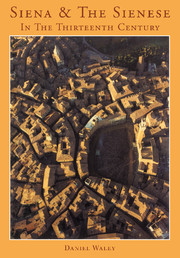Book contents
- Frontmatter
- Contents
- List of illustrations
- List of tables
- Preface
- Acknowledgements
- Glossary
- Abbreviations
- Chronology of principal political events and developments
- 1 Siena
- 1 Setting
- 2 People
- 3 Institutions
- 4 Oligarchy
- 5 Problems
- 6 Religion
- 7 Assumptions
- 8 Revenue
- 9 Expenditure
- 10 Continuity and change
- General Index
- Index of personal names
- Index of places
- Frontmatter
- Contents
- List of illustrations
- List of tables
- Preface
- Acknowledgements
- Glossary
- Abbreviations
- Chronology of principal political events and developments
- 1 Siena
- 1 Setting
- 2 People
- 3 Institutions
- 4 Oligarchy
- 5 Problems
- 6 Religion
- 7 Assumptions
- 8 Revenue
- 9 Expenditure
- 10 Continuity and change
- General Index
- Index of personal names
- Index of places
Summary
Discussion of institutions on their own is somewhat barren and must be vitalized by consideration of those who exercised power through them. The question to be asked concerning a city-republic is not ‘was it controlled by an oligarchy?’ but ‘what sort of oligarchy or oligarchies controlled it?’. Hence the need to investigate the social status of the principal office-holders and conciliar speakers and the degree of continuity: did political developments or the passage of time bring about significant changes in the personnel of the governing class, or did this class show strong powers of survival?
THE GREAT FAMILIES
The starting-point must be those dynasties of landowner-financiers characteristic of medieval Siena, for names such as Tolomei, Piccolomini, Salimbeni, Gallerani and Malavolti appear constantly as holders of prominent positions and conciliar orators. A tendency towards a more formal classification in the upper levels of Sienese society is implied by the increasing use of family names – the advent of the surname – after the middle of the thirteenth century; up to that time the use of a patronymic had normally sufficed. This development was almost certainly intensified by the ‘anti-magnate’ laws of 1277, in which fifty-three families were named as casati, whose members had to deposit a payment as pledge for good behaviour and were ineligible for the main office, then the Thirty-six. Though the families declared magnates in 1277 are not identical with those which acquired surnames, it was uncommon for a dynasty not in the 1277 list to gain the additional ‘de’ with the plural (surname) form.
- Type
- Chapter
- Information
- Siena and the Sienese in the Thirteenth Century , pp. 77 - 96Publisher: Cambridge University PressPrint publication year: 1991



